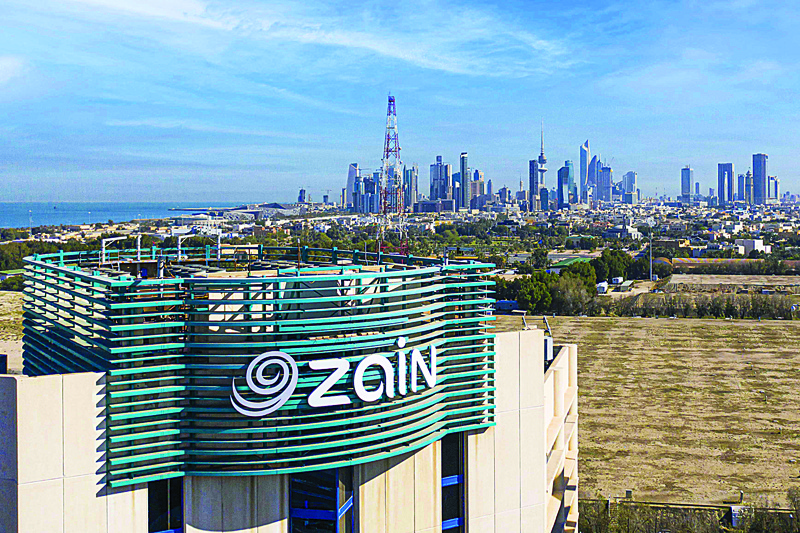KUWAIT: Zain Group, the leading mobile telecom innovator in seven markets across the Middle East and Africa, announced its inclusion in the global list of the CDP with an advanced rating in Management Scope 'B' for the Climate Change Index. This rating makes Zain the highest ranked and only telecom operator in the Middle East and Africa to achieve this positive rating with respect to its efforts to address climate change.
As an active member of the GSMA Climate Action Team since in 2019, Zain begun disclosing its environmental impacts, energy consumption and carbon emissions through the CDP, a non-profit organization with regional offices in 50 countries. There are now companies, cities and regions in over 90 countries disclosing emissions data to the CDP Foundation, which is also recognized by prominent global indicators, including the MSCI Index of Environmental, Social and Corporate Governance (ESG), which reflects the evolving needs of investors who aim to integrate indicators.
For the second year in a row, Zain succeeded in meeting the requirements stipulated by the CDP for membership, remaining one of a few signed-up members from the region. Zain attained the 'B' rating within the category of global companies that disclose the environmental impact of their operations, which indicates that the telco exceeded the global average of 'C', and the regional average for Asian markets of 'D'.
Bader Al-Kharafi, Zain Vice-Chairman and CEO of the Group said, "At Zain, we are aware of the urgent need to address the climate crisis the world faces, and we also realize that to achieve sustainable growth, we must participate in global efforts to protect the planet and preserve its resources. Zain has taken significant strides towards addressing its environmental footprint by setting goals to reduce carbon emissions, reduce waste, raise awareness, and identify risks and opportunities for climate change."
Al-Kharafi continued, "Having this high 'B' rating in recognition of our efforts to disclose and reduce the carbon footprint of our operations will spur us further in dedicating ourselves to the regulatory reforms included in the Paris Climate Agreement of 2015. Moreover, disclosure of climate measures is a strong indicator of transparency for our customers and investors."
Al-Kharafi concluded, "In conjunction with trusted partners such as the CDP Organization, it is imperative that we intensify our own efforts to make environmental reporting and risk management a commercial standard, as this will help us build stronger partner and supplier relationships with organizations that are jointly committed with us to disclosing carbon emissions, and working together towards making this a cleaner, more sustainable world."
Only 35 percent of the 9,600 companies and institutions included the CDP list attained Management level score or higher, of which Zain was one, emphasizing the company's commitment to fulfilling its promise to make systematic changes through the CDP, and to provide a transparent framework for climate change reporting.
Zain's climate action plan has set targets to reduce emissions, reduce waste, and align with UN Sustainable Development Goal number 13. The company is committed to building climate change scenarios that would help limit global warming to 1.5 degree Celsius compared to pre-industrial levels, and the company strongly believes this strategy will help achieve a reduction in emissions, and operating costs, while also mitigating risks related to climate change.
CDP manages the global disclosure system for investors, companies, cities and regions to manage their environmental impacts, and is viewed as representing the gold standard for environmental reporting with the most comprehensive set of data on corporate and city actions. Over 560 investors investing in assets valued at $106 trillion, rely on information provided by CDP to help guide their investment decisions, and more than 150 buyers with over $4 trillion in procurement spending, utilize CDP data to support their investment strategies and purchases.
CDP collaborates with a large number of stakeholders in a wide range of areas including Business Organization for Social Responsibility (BSR); World Business Council for Sustainable Development (WBCSD); Global Reporting Initiative (GRI); Sustainability Accounting Standards Board (SASB); Climate Disclosure Standards Board (CDSB); World Wildlife Federation (WWF); Alliance for Institutional Transparency (ACT); Science Based Targets Initiative (SBTi); United Nations Global Compact (UNGC); and United Nations Climate Change Initiative (UNCC).
The mobile telecommunications industry is working to become completely transparent about climate emissions for the industry. The sector has developed a roadmap for climate action at the industry level, with the aim of achieving "net-zero" greenhouse gas emissions by 2050, and reducing carbon emissions by 50 percent by 2030, in line with the Paris climate agreement.











